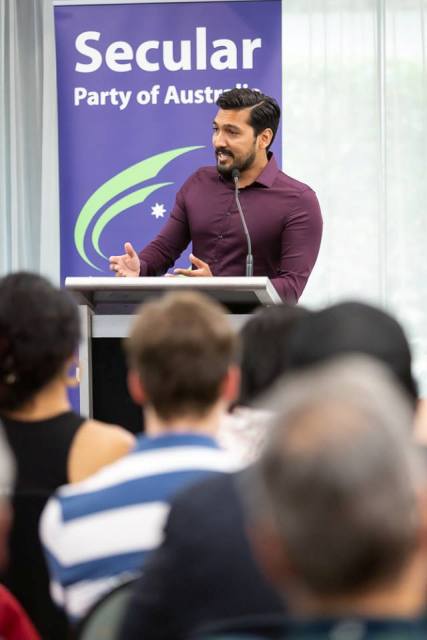Although Nissar Hussain and Wilson Chowdhry were invited to speak at the ‘Losing My Religion’ event held by the Secular Party of Australia (SPA) on 9th February 2019, the group apparently omitted taking images of the two speakers. We accept this was an accident and not a direct result of them being the only Christian speakers at a secular event and thank SPA for allowing us to participate. The Image is of Harris Sultan who coordinated the event.
Though this simple survey is by no means comprehensive and the data could be will be further analysed, I believe it is an adequate sampling that supports the need for further research, and demonstrates the fear that Ex-Muslims have at going to police.
If you would like to participant in our World-Wide Survey on apostasy-related hate crime, which will be inserted into a more global report please (click here) for the link.
UK:
British Pakistani Christian Association submitted written evidence to the UK Home Office Islamophobia Review Committee prepared by Keri-Lynn Gibbs, and part of that submission included a brief survey she conducted on apostasy-related hate crime against Ex-Muslims. We will be printing and publishing copies of the report which will be on sale from our website from sometime next week. However in the meanwhile electronic copies of the report can be purchased for £2 by emailing admin@britishpakistanichristians.org.
The survey was submitted to various groups with a population of Ex-Muslims. She said:
“I want to thank all the people who shared this survey with their constituency including W Chowdhry, S Hameed, H Sultan, N Wolfe.
“My rationale for this survey was this: I really want to know how hate crimes against apostates from Islam were handled and documented by police.”
Ms Gibbs, whose background in Applied Linguistics, and Information Access further informs the assessment process, wrote:
“It is important to note that when making an Information Access Request many individuals have difficulties finding the information they are looking for because of a lack of shared language. In order to locate data, it needs to be organised in the appropriate linguistic taxomony.
“If those called upon to make a judgement about the quality and context of the information at the time of collection do not have the language to manage it for later assessment, then that data can be lost, hidden, or misappropriated at the point of collection, which is in this case, the scene of a crime.”
This is a brief survey of apostasy related hate crime. It contains just five questions and was posted for just over a week the 31st of January 2019 and documented for the Islamophobia Review Committee report on the morning of February 4, 2019 with 85 respondents and the data seen here it is updated from the initial publication as there have been an additional 9 respondents for a total of 94 respondents.
The results were anonymously given and we attempted to control who responded by asking if the individual was Ex-Muslim, and by directly distributing the survey to various Ex-Muslim organisations, Christian Ministries in order to locate Christian converts from Islam (‘Muslim-background believers’), and apostates from Islam to secularism. Ms Gibbs did not close this survey and will update it again in the future.
She also prepared a region specific survey to launch at the “Losing Your Religion Conference” for Ex-Muslims in Melbourne, where president Wilson Chowdhry and apostasy hatred survivor Nissar Hussain was invited to speak to Ex-Muslims who left Islam for atheism, agnosticism, and humanism. This survey also added an optional question about peoples reactions to apostates removing of hijab.
The world-wide survey linked in this article is an expanded version, with additional comment fields for those who would like to share more information, or who need further resources.
The primary impetus behind this survey, was to collect some data about whether Ex-Muslims contact police when they experience apostasy related hate-crimes, why they might not, and why the incidents may not be categorised as a hate-crime at the time of collection.
Q1 Are you an Ex-Muslim?
100% of the people assessed in this survey were Ex-Muslims.
There were 5 respondents who indicated they were Muslim removed from this data. This interference was from the UK, and Canada. This survey was briefly exposed to individuals from the religious emancipation movement who indicated they wanted to share it at their mosque.
If this survey data was impacted, it would direct the results towards apostasy related hate crimes being minimised, however even with this possibility the results appear to robustly support that apostates who experience black-lash for leaving Islam are normally persecuted and do not make police complaints. When they have gone to police it is in a western democracy and that more violent persecution may be allotted to domestic violence statistics. The data seems to indicate if there was any other reason to blame apostasy hatred on, that was how the hate crime was categorised instead.
Q2 Which country are you a citizen or resident of?
Noting the extreme level of violence in “Other” countries, may indicate a greater need for attention to the cultural adjustment of first generation of immigrants. Country selections were assigned because the British Pakistani Christian Association operates in the UK, Australia, and Canada and we wanted to distinguish these countries’ results. As a British born Christian convert from Islam, Nissar Hussain’s experience is noteworthy, as he was initially open with his close friend about his change of faith, but learned the draconian consequences.. There may some different patterns n apostasy-related incidents, in first wave immigrants, and their native born children, and a possible reclaiming of religious fervour by the third generation that could be further explored in democratic countries such as the UK. The UK responses are disclosed at the end of the general survey disclosure of the survey results which lists respondent comments on each question.
66 respondent identified their country of origin from 22 different countries.
2 from Algeria; 6 from Bangladesh; 1 from Belgium; 2 from France; 6 from Malaysia; 2 from Maldives; 2 from Nigeria, 1 Norway, 12 from India, 1 from Iran; 1 from Italy; 12 from Pakistan; 1 from Romania; 1 from Saudi Arabia; 2 from Somalia; 1 from Sweden; 1 from Morocco; 2 from Turkey; 1 from Tunisia; 1 from UAE; 4 from United States of America; 1 from New Zealand
Q3 Have you experienced any persecution or hate-crimes for no longer being Muslim?
Most ‘No’ respondents also said that they kept their decision to no longer be Muslim a secret in one of the other questions.
One ‘No’ respondent said they were accepted by Muslim family (this was a UK respondent), others did not qualify their answer and some of these answers corresponded with the times and locations that some of the 4 respondents who indicated they were Muslim.
Regardless of whether the numbers were inferred with the percentile of apostates those who self-identify as persecuted is not negligible even in the UK where the results seem to indicate an either/or attitude – meaning 50% are either accepted after leaving Islam, or choose to live closeted lives to avoid persecution; and 50% suffer forms of persecution across the spectrum.
Since some level of hostility seems to be expected, they may also have a high tolerance for abuse, and not consider some negative reactions ‘persecution’ or a ‘hate crime’. They also love their persecutors and some have said that they did not want their family to get in trouble.
One Q3 ‘No’ respondent gave answers to Q4 explaining their persecution indicating their answer for this question is ‘Yes’ and may have misunderstood this question because I asked ‘for longer being a Muslim’ instead of using the term ‘Ex-Muslim’.
Q4 What kind of persecution? Please check all that apply.
Some respondents wrote in actions of persecution that were not written in the selection criteria such as kidnapping, doxxing, being disinherited or forbidden to see siblings.
Many indicated the reason they are not persecuted is that they fake being Muslim. All who answered ‘Yes’ experienced hate speech for being Ex-Muslim in the form of ‘Verbal harassment, ill wishes, or insults.
Comments:
1)Can’t explain in some word?? 2) Threats, family pressure, prejudices in social circle 3) official pressure; 4) Discrimination, ex communication, disowning; 5) Disowned and Disallowed to see my siblings; 6) My girlfriend left me 🙁 ; 7)Severed from family (both sides) and disinherited; 8) Most of the muslim people from my city knows that i have left islam. They hate me, insult me and try to do bad things on me; 9) hard feelings; Excommunicated; 10) Death Threats, Doxxing Threats; 11) Kicked out of the house as a guest; 12) Kidnapping- alienation- 13) Sexual assault – my own brother and his friends
5 NO RESPONDENT COMMENTS
1)I don’t talk about it publicly; 2) only close friends, Faking being Muslim; 3)I didn’t tell anyone about me leaving islam; 4I haven’t been persicuted due to me pretending to be a muslim; 5) No persecution because obviously we can’t open up about being atheists in Pakistan
Q5 Have you ever sought help or called the police after your experience?
A small number of those responding ‘Yes’ to persecution reported to police, and of those who did, the crime could have been documented in another category, such as domestic violence. Most respondents in western countries commented to the effect that that they would not be taken seriously, expressed fearing that they did not want to be doxed, and those in non-western countries said that the police were also Muslim, or that their lives would be in danger. Another answer that came up is that the apostate did not want their family to get into trouble for how they were treated the person quitting Islam.
46 comments
- Because everyone is same here even the law of my country said to kill me without any second thought the reason why i’m still alive here in country is because i do not com out as a ex-muslim if i do or anybody knows my own father will kill me before anyone can ever even try to kill me i cannot be truly myself it’s almost like i’m a slave i cannot be myself!
- Some Muslim members of the police might sympathize with the aggressors
- They do nothing
- I don’t trust them. The Moroccan legal system is not exactly on my side. I don’t think they can help.
- because dont wanna get in trouble.
- Death penalty for apostasy in Pakistan
- Police would just abuse me more
- I had no evidence. It would have been my word against theirs.
- I am silent about it
- Most of my Muslim friends were understanding and it didn’t change our friendship.
- No point
- They ignored beacuse im an ex muslim
- Coz,I hate the media.
- My father assaulted me. I thought he was going to kill me.
- I was physically assaulted at a young age by family, I knew the police would side with them as law enforcement here is non aggressive and frequently bends the law.
- they, (the police) are always in support of them (the other irrational muslims)
- They too are Muslims
- I think pak police will arrest me. I’m an ex Muslim and gay. Pakistan criminalize both homosexuality and apostasy. They’ll take side of the other person I’m sure.
- They do not live here. Plus, I cannot be bothered.
- The police are sh*t
- Its a Crime in Pakistan to criticize Islam or leave Islam and comes with death in pakistan
- Because i know that i would not get justice in majority muslim people country as well from police too.
- I was threatened to death by my cousin’s friend, then I tell my cousin and he assured me of my safety.
- Scared of the repercussions
- very few friends and immediate relatives knows it they think m sick
- Police are Muslims too so they want help an atheist person
- Risk exposing myself
- Because defenders of Islam are pussies. They won’t come after me. I worry more about women.
- As it was most verbal and all of it was coming from my childhood friends so i thought it would not be appropriate to call the police in that type of thing.
- Police don’t take any crime related to Islam seriously.
- Because police may rather persecute you for this. As we know apostasy is crime in Shariah.
- Most of it was family. Didn’t want to get them in trouble.
- I haven’t told anyone i m sn ex muslim
- No physical harms done
- because i scared
- No one knows about me leaving islam
- We aren’t a recognized minority in the country. We don’t legally exist.
- fear
- no, because being ex Muslim is punished by the loyer
- Online insults
- Police would just arrest me and give me the sharia sentence
- The police won’t help.
- Because it is illegal to be a non muslim in maldives
- I’m not self sufficient to publicize my ideas.
- Not recognised as abuse
- I was afraid the police will take my family s side
If you would like to participant in our World-Wide Survey on apostasy-related hate crime, which will be inserted into a more global report please (click here) for the link.
British Pakistani Christian Association, continues to provide advocacy and humanitarian aid to Christians in Pakistan and the Pak-Christian diaspora. We cannot do it without your help please donate by clicking (here)


